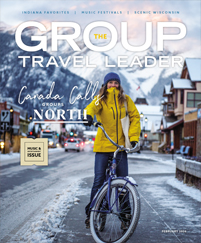The civil rights movement of the 1950s and ’60s shaped America and the world in powerful ways. Today, the places and people involved in those events are memorialized on the U.S. Civil Rights Trail (USCRT), a collection of more than 120 historic sites that is gaining both widespread attention and a growing list of members.
The trail is organized by the USCRT Marketing Alliance, which consists of 14 state tourism departments, as well as Destination D.C. leaders from the National Park Service and respected historians. The alliance was formed and the trail launched in 2018.
As a result of the organization’s work, civil rights sites throughout the South are enjoying a surge in interest and visitation.
“The biggest impact has been that the topic of civil rights tourism is much stronger than ever before,” said Lee Sentell, director of the Alabama Tourism Department and chairman of the USCRT Marketing Alliance. “Quite literally, the launch of the trail two years ago marked the beginning of it as a separate category in the industry.
“We’ve been promoting civil rights sites for 15 years, and it was always thought of as a niche market,” Sentell said. “But now, because so many other Southern states have embraced it, I think it’s becoming a legitimate, regular category. People in our office have told us that they’re hearing from a lot more tour operators and planners than ever before. It had been a uniquely Alabama product for the most part, but now it is much broader across the rest of the South.”
Accolades and Accomplishments
Since its launch two years ago, the USCRT has been covered by a number of high-profile media outlets. It has also garnered several tourism industry awards.
The trail was recognized with a gold award for Best Destination in a Region from the International Travel and Tourism Awards in November 2019. In August, it was also awarded the Mercury Marketing Award for its marketing excellence. In the trail’s second year, its website achieved more than 1 million page views.
Traffic to that website — civilrightstrail.com — has led to a quantifiable increase in consumer interest.
“Our ad agency’s research shows that about 35% of people participating in a survey have indicated that they are interested in civil rights as a travel product,” Sentell said. “In years past, that would have been in the single digits.”
New Members
The USCRT Marketing Alliance recently announced the addition of four new sites to the trail, which has continued to grow over the two years since its founding.
The additions include two attractions in Kentucky: the Muhammad Ali Center in Louisville and the SEEK Museum in Russellville. The trail also added the Beal Street Historic District and the WDIA Radio station, both in Memphis, Tennessee.
“We are delighted about the additions,” Sentell said. “We know they will make incredible additions to the trail as a whole, which continues to showcase how what happened here changed the world.”
The Muhammad Ali Center is a multicultural center and museum that captures the inspiration of Muhammad Ali’s life. In addition to learning about the boxing career and personal motivations of the legendary figure, visitors discover his work as an outspoken proponent of civil rights causes.
The SEEK Museum recognizes the work of journalist Alice Allison Dunnigan with a life-size bronze statue and exhibits about her achievements. This civil rights pioneer was the first African American woman admitted to the White House, Congress and Supreme Court press corps.
In Memphis, historic Beale Street was a thriving area for black commerce and culture during the time of the Civil War and later became a hub of community organization and demonstration during the civil rights movement. And WDIA was the first radio station in the country programmed entirely for the black community starting in 1947. Its signal reached through the Mississippi Delta to the Gulf Coast.
Pursuing World Heritage Designation
In addition to compiling and publicizing the trail, members of the USCRT Marketing Alliance have also been involved in a parallel effort to nominate significant places on the trail for inscription as UNESCO World Heritage Sites.
“There aren’t many World Heritage Sites — less than 1,400 throughout the world,” said Ed Hall, a consultant who is helping guide the marketing alliance’s UNESCO efforts. “So it’s kind of like the Good Housekeeping Seal; it says this is something worthwhile that will add value to your visit.”
The process has been underway for several years and will take at least two years more. But Hall said the plan is on track and on time.
Along with researchers from Georgia State University, Hall has worked with the National Park Service’s office of international affairs to send a list of significant civil rights sites to UNESCO’s International Council on Monuments and Sites (ICOMOS). If ICOMOS approves the list, a formal application will be sent to the World Heritage Committee, a group of 21 nations.
“Our preliminary document has gone to ICOMOS for evaluation,” Hall said. “Once we get that back, we’ll submit the formal application through the National Park Service to the World Heritage Committee. Our hope is we can get that done and be before the committee when it meets in July of 2021.”
The application process involves a fair amount of paperwork and red tape, and each site nominated will have to submit detailed documentation describing its historical significance and future viability. Sites that are inscribed on the World Heritage list should see significant increases in visitation, especially from international markets.
“At the end of the day, it will be worth all the time and effort we’re putting into it because these are significant sites that need to be preserved for the future,” Hall said. “The things that happened here had a dramatic influence in places like South Africa, Poland and even Tiananmen Square. So all the effort and bureaucracy is going to be worthwhile.”












